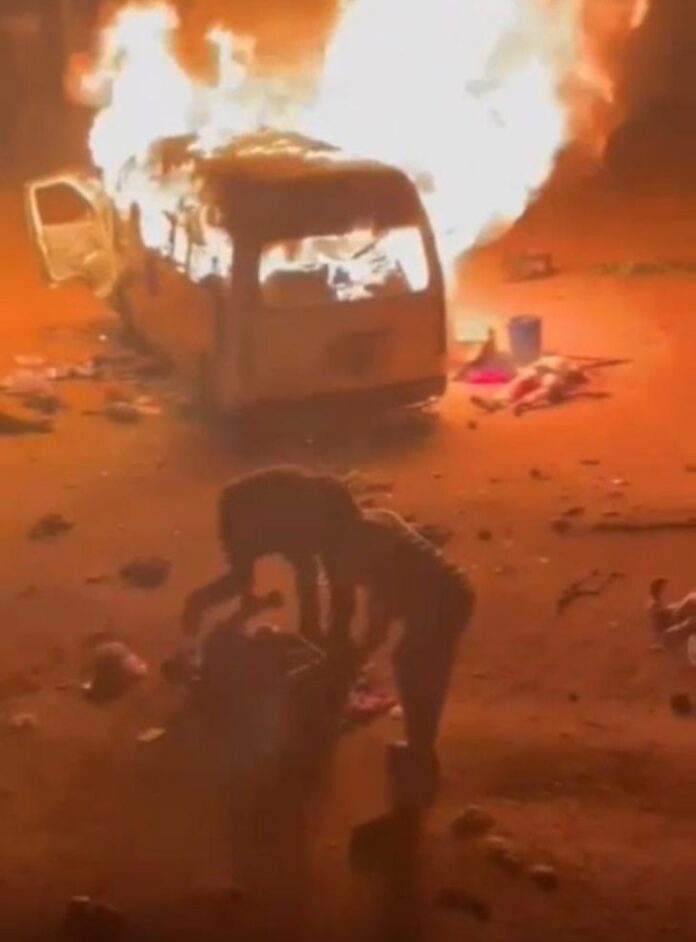By Abdullahi Inuwa
MANGUN, Plateau State — In the heart of Nigeria’s Middle Belt, a gruesome massacre has torn through the conscience of the nation. A respected staff member of Ahmadu Bello University (ABU), Zaria, alongside his wife, children, siblings, and extended relatives, was brutally murdered in broad daylight by a mob in Mangun community, Mangu Local Government Area of Plateau State.
This was no random tragedy. It was a targeted execution.
The victims were not armed. They were not criminals. They were not strangers. They were on their way to celebrate a wedding — a joyous family gathering — when they were intercepted, dragged out of their university-branded vehicle, and butchered. The ABU convoy bore official government plate numbers, a clear symbol of the nation’s academic pride. But even that did not shield them from the bloodlust of their killers.
They were not faceless. They were not unknown.
And neither were their killers.
According to eyewitness reports and multiple local sources, the attackers were residents of the very community through which the convoy was traveling. These assailants are known — by local leaders, by traditional rulers, by security operatives, and by government officials. Yet, days after the massacre, not a single arrest has been made. Not one person has been questioned. The silence from the Plateau State Government and security agencies is not just deafening — it is damning.
The local government chairman of Mangu LGA, elders of Mangun community, and Plateau’s security network are all aware of the identities of those who took part in this heinous act. But instead of swift justice, the state government has taken refuge in cowardly rationalizations, offering excuses rather than accountability. By refusing to condemn the attack for what it was — an organized, targeted massacre — the government has effectively sanctioned silence. And that silence speaks volumes.
This isn’t just another violent episode in a region scarred by intercommunal tensions. This is the murder of a man who had spent his life in service to knowledge. The slaughter of his children — innocents whose only crime was their identity. The execution of a woman whose only “offense” was loving her family.
This was a deliberate erasure. A message sent. And a government’s failure broadcasted.
No amount of state-sponsored rhetoric can obscure the fact that an entire family was publicly lynched while law enforcement looked the other way. That the killers walked away, knowing there would be no consequences. That the state’s refusal to act amounts to complicity.
“This is not just about the dead,” said a fellow academic from ABU, who spoke under anonymity for fear of reprisal. “It is about every single Nigerian who could be next. If a respected university official can be killed in full view of the public — in an official convoy — and no one is held responsible, then no one is safe.”
Social media has erupted in outrage. Hashtags like #JusticeForABUFamily and #PlateauMassacre have been trending, with thousands demanding answers. Advocacy groups, including the Digital Human Rights Nigeria (@DHQNigeria), have called for immediate intervention from the federal government and the arrest of all perpetrators.
Security agencies — including the Nigerian Army and Police Force — are yet to provide a meaningful update. No joint task force has been deployed. No investigation has been announced. No names released. The silence is no longer neglect; it is negligence with intent.
Nuhu Ribadu, Nigeria’s National Security Adviser, is being urged by civil society groups and human rights organizations to personally intervene. “This cannot be swept under the carpet,” read a statement from Citizens United for Justice. “If a government cannot protect its citizens, especially from known threats, then what is its purpose?”
The tragedy also raises serious questions about the state of law and order in Plateau State. If known mobs can openly execute families in broad daylight and face no consequences, then what message does this send to other communities battling violence?
Even more chilling is the normalization of such horror. The response from Plateau State officials has been characterized by carefully worded statements avoiding accountability. No condolence visit. No strong condemnation. No emergency security response. Just silence — the kind of silence that emboldens future murderers.
And the public is not fooled.
“These people were not just murdered. They were erased,” said a community leader from Kaduna, where the family once lived. “They were erased by killers who believe they are above the law — and by a state government too weak, too afraid, or too indifferent to care.”
For a country grappling with growing insecurity, ethno-religious violence, and a crisis of leadership, the Plateau massacre is a symbol of all that is broken. It is a call to action that must not be ignored.
Until arrests are made. Until the killers are named. Until the Plateau State Government stops spinning excuses and starts delivering justice — it stands complicit. And history will not forget who stood silent while a family was butchered in the open streets of Mangun.
This is not a conflict. This is not a clash. This is murder. And it must be called by its name.




